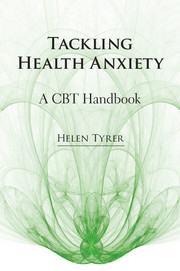Book contents
- Frontmatter
- Dedication
- Contents
- List of tables, boxes, figures and case examples
- Foreword
- Preface
- Part I Principles and practice of CBT for health anxiety
- Part II Presentation and aspects of management of health anxiety, by medical specialty
- 10 Cardiology
- 11 Respiratory medicine
- 12 Gastroenterology
- 13 Endocrinology
- 14 Neurology
- 15 Genitourinary medicine
- 16 Pain management
- 17 Conclusions
- References
- Index
12 - Gastroenterology
from Part II - Presentation and aspects of management of health anxiety, by medical specialty
Published online by Cambridge University Press: 01 January 2018
- Frontmatter
- Dedication
- Contents
- List of tables, boxes, figures and case examples
- Foreword
- Preface
- Part I Principles and practice of CBT for health anxiety
- Part II Presentation and aspects of management of health anxiety, by medical specialty
- 10 Cardiology
- 11 Respiratory medicine
- 12 Gastroenterology
- 13 Endocrinology
- 14 Neurology
- 15 Genitourinary medicine
- 16 Pain management
- 17 Conclusions
- References
- Index
Summary
Gastroenterological conditions that may cause health anxiety
Gastroenterological complaints feature frequently in patients with health anxiety and can be magnified in patients with underlying confirmed pathology because of superimposed anxiety.
Diseases that feature particularly prominently in media coverage are often the focus of these fears (in recent years, bowel cancer), and the extra screening associated with this where there is a strong family history. There are clear guidelines for such screening and investigations, but exceptions occur, particularly where patients have persistent troublesome symptoms or where they are unduly worried. Thus, many anxious patients may undergo unpleasant and unnecessary investigations, which at times will yield inconclusive or unclear results, adding to their fears.
Diagnostic labels such as ‘irritable bowel syndrome’, ‘unexplained vomiting syndrome’ (Case example 12.2, p. 104) and ‘nutcracker oesophagus’ are often given to complaints that are heavily associated with anxiety and largely unexplained. Often, patients cling to these labels, but this usually offers little in the way of relief and they tend to live lives dominated by these symptoms, frequently believing there is more severe underlying pathology that the doctor has failed to find.
Inflammatory bowel disease, in the form of Crohn's disease and ulcerative colitis, can cause huge disruption to patients’ lives, and the anxiety generated by pain, troublesome diarrhoea and rectal bleeding can not only be difficult to cope with, but can also exacerbate the problem.
Clarifying past medical communications
Clear criteria guide physicians in terms of symptoms and the level of investigations required to exclude certain conditions, for the symptoms experienced are often very non-specific, such as altered bowel habit, cramping stomach pains or nausea, symptoms universally experienced from time to time by everyone. However, some symptoms are particularly distressing, such as rectal bleeding, where a small amount of blood from, for example, a small anal fissure (an anal tear often caused by constipation) or a small haemorrhoid can look quite alarming when dispersed by the water in the lavatory pan. Because many of these symptoms are so non-specific, there are often posters in the GP surgery and elsewhere, or notices in media coverage of medical matters, alerting patients to be vigilant for signs of possible underlying illness (e.g. bowel cancer) and not to ignore persistent episodes of bleeding (Case example 12.1).
- Type
- Chapter
- Information
- Tackling Health AnxietyA CBT Handbook, pp. 102 - 107Publisher: Royal College of PsychiatristsPrint publication year: 2013

